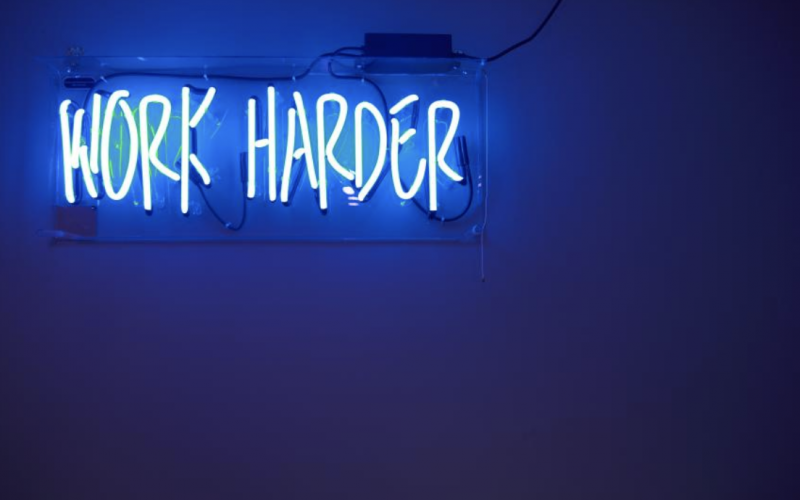If you go to the gym without your headphones, you might hear the phrase ‘muscle failure’ around the weights section. Basically, it means training your muscles beyond their limit to the stage that they can no longer continue with the task they’re doing. The point? To raise the bar (quite literally) and grow additional muscle.
Now, what if we took that concept and applied it to the brain?
The last few decades have marked an era of clocking in beyond our contracted hours, with UK workers reportedly totalling £31 billion worth of unpaid overtime last year. The idea of staying at our desks until 11pm as the “office hero” is something we’ve all experienced – either as a spectator, or the one wearing the pinstripe cape. But a 12-hour working day is far from normal and what actually happens when your brain becomes overworked?
According to psychological scientists at the Karolinska Institutet in Sweden, overworking and trying to multitask (although I will concede the ‘myth’ of multitasking existing itself, as my co-founder outlines here) can cause the prefrontal cortex (the part of the brain that’s responsible for cognitive function) to wear thin, and reduces the connectivity between different parts of the brain. Leading to decreased creativity, working memory and problem solving skills.
It also causes the amygdala (the part of your brain that controls emotional reactions) to enlarge, which could explain why a less-than-lightening-speed wifi connection can be that bit more frustrating as you reach your 16th hour in front of a spreadsheet.
When this happens, productivity goes from a consistent cruise to the mental equivalent of walking up an escalator. In other words, you’ve reached your limit.
But what is a normal limit?
Working 9-to-5
Way back in the industrial revolution, when people were working an average of 10-16 hours per day, Robert Owen campaigned that no one should work more than eight. His slogan was “Eight hours labour, eight hours recreation, eight hours rest.” and so, the eight-hour working day was born. The thing about the eight-hour “even split” is that it’s 200 years old and so, doesn’t take into consideration that most people who are working have to use that recreation time to travel to work, make food, do the washing, look after the family, get some form of exercise and maybe even add a hobby or two.
The Three-Day Weekend
A company in New Zealand trialed a four-day working week, that allowed the team to earn the same as they were on five days. They could either work four, eight hour days or flex it around their own plans and limits. The result? Productivity levels stayed the same, despite less work time, and 78% of the team felt that they were able to successfully manage their work-life balance.
The Four-Hour Work Week
On an even more extreme end of the scale, American author, entrepreneur, and public speaker, Tim Ferris sees the four-day work week and raises it the four hour work week. How? Delegation. His theory is that you can spend your time on 20% of the tasks that get you 80% of the results and delegate the rest to free yourself of the day-to-day tasks that make up most of the standard working week.
The Early Bird That Gets Sh*t Done
Over billions of years, all living creatures have adapted to circadian rhythms (body clocks, to you and I) which determine when we sleep, wake up and eat. According to research by author Jennifer Ackerman, our brains are most alert 2.5 – 4 hours after waking up, meaning that the best time to tackle those important tasks is in the morning. The question is, which tasks do you choose? Do you use your strongest brain hours trying to multitask and get everything done (but don’t actually make a real dent in anything) or tackle the tasks you dislike the most to get them out of the way, but reach your limit before you get to the tasks you actually enjoy?
So what’s normal for you?
As you can see, there are lots of different theories on what a “normal” limit is and I guess, that’s the whole point. The normal limit is what’s normal for each person on that particular day. There are so many factors that can affect our mental limit – from lack of sleep and the season, to the number of distractions around us and how much we enjoy the task at hand. By listening to our brains and understanding the signs (fatigue, boredom, lack of concentration) we can understand our limits and plan our days around them.
That’s why our ibLE PA’s all work around their own schedules and clients are only billed in 5-minute increments, so no time is wasted like it would be in an office. For us, it’s all about understanding limits and adapting around them to get the very most from productivity.
Ready to make the most of yours? At ibLE, we set you up with your own dedicated personal assistant, where you only pay for what you need. Get started today.


3 comments
Comments are closed.